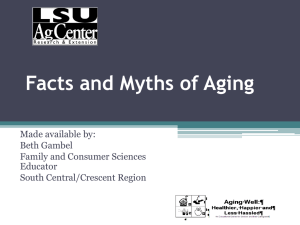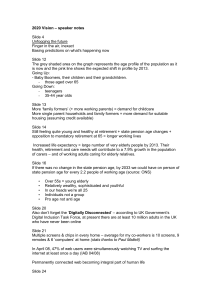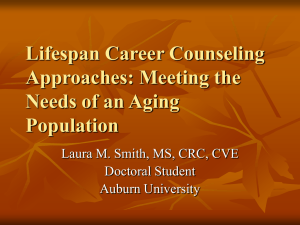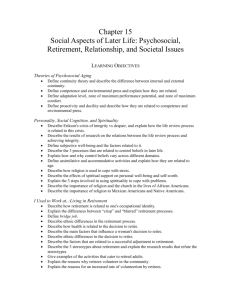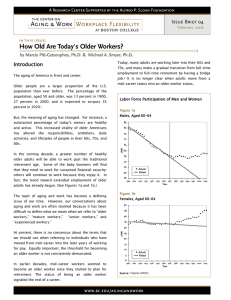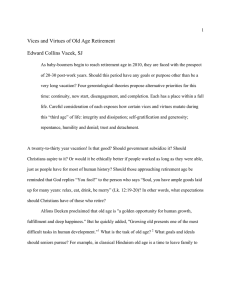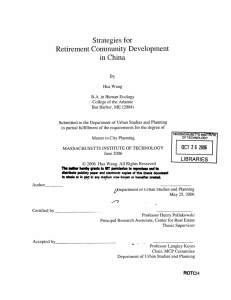What's My Secret? - Master the Possibilities
advertisement
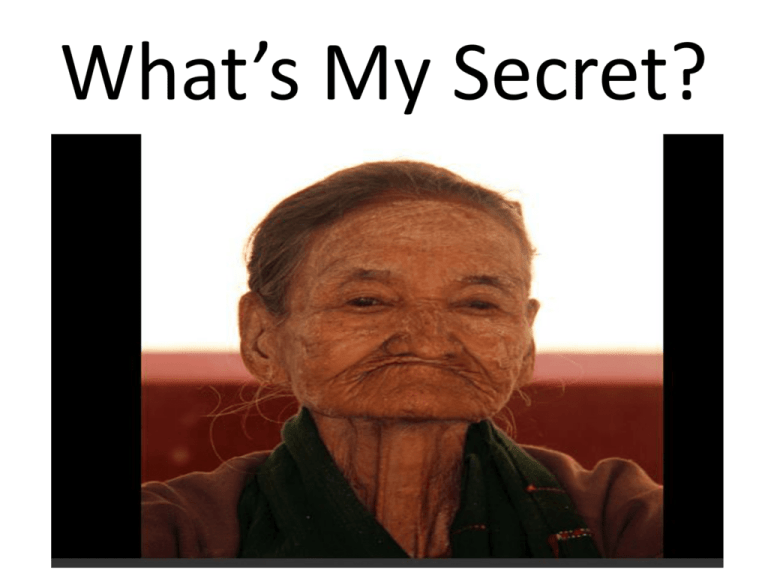
What’s My Secret? Oil of Ole’ Age • This was a birthday card. • Chosen as the most despicable by AARP Are we all bad drivers? • Such cartoons stereotype all of us. • How true is it? • What are the statistics? And speaking of secrets Don’t Talk Yourself Over the Hill A perspective of psychological aging Presented by Evelyn B. Kelly PhD, Medical writer and author evelykell@aol.com What do you think older adults are like? • Give me an adjective that in your minds describes older adults. • Note I did not use the words “senior citizens”. • Where did you get your information? •How Old Would You Be if you did not know how old you were? Satchel Paige Go back to 1900’s • What was retirement like? • Because of lack of communication, many people did not know how old they were. • Older people lived with relatives- made what contributions they could to the livelihood of the family. So when did the idea of retirement at 65 begin? Otto von Bismarck: 1885 • Wanted to get rid of some older officers • Created a system to enable them to leave the army • Set the age at 65 New Deal picked up age 65 • The Social Security Act was signed into law by President Roosevelt on August 14, 1935. In addition to several provisions for general welfare, the new Act created a social insurance program designed to pay retired workers age 65 or older a continuing income after retirement Development of the retirement culture • For the past 50 years, retirement has been depicted as a lifestyle of leisure and luxuryplaying golf in tropical settings, traveling through the world, dining. • However, a segment of society cannot reach these lofty goals- forced inactivity, illness, barely making ends meet • Retirement has become part of the American dream- but what is the reality? Up to 1960retirement meant being put out to pasture • What changed in 1960? Del E. Webb in 1960 • Massive marketing campaign for his Sun City Retirement community • Groups of older people together- older people grouped as go-go’s, slow-go’s, no-go’s At some point the idea that we are getting older creeps into our thoughts • It is not that we are getting older- but that we are getting OLD Let’s look at the Labelers • Your label in society Television Comedy • Those around you • Strangers/unthoughtful people Now a little theory Kuypers and Bengtson’s Social Reconstruction Model • Your sense of self, • Your ability to relate self to society, and • Your personal mastery • Everything is related to social labeling and values that one experiences. • Aging assumes a pathological quality because of the nature of environmental changes. • Reorganization in later life • What are some of the ways your life has reorganized? Seven Steps that make up going downhill • 1. Precondition of susceptibility • Locus of control theory: Internal/external • Internal- behaviors are guided by personal decisions • External- forces outside control you • Example: your health decisions 2. Dependence on external labeling • Do we depend on others to make us what we are? • Not bad for an old man. • Grandma was slow but she was old 3. Social labeling as incompetent • Lifestyles associated with different stages of life cycle are roles learned in culture. • Images of old age cultivate our concept of aging and age roles we assume. IALAC • I am lovable and capable. Stereotypes in media and popular culture Television • Wholesale distributor of images and the mainstream of our popular culture, world of places, people, roles. • Most of us experience this world with little selectivity or deviation for an average of 30 hours a week. We are portrayed as helpless victims. • We are sweet and vulnerable. • “Elderly Ocala woman scammed out of her life savings” • “Police hunt driver who hit elderly man in wheelchair then fled” • We are pictured as being warm, but incompetent figures who deserve our pity. • We are vulnerable children in need of protection and charity. But, as is often the case with children, this narrative makes it easier for the opinions, concerns, and contributions of elders to be marginalized and discounted. Those who defy negative stereotypes are presented as bizarre and comical. • The Geezer Bandit- in his 70s- most bank robberies get little attention • Older person fended off an intruder with a frying pan. Why is this newsworthy? • Madea- the gun-toting granny Gun-toting Granny • Movie-goers chuckle every time Tyler Perry's character, Madea, pulls a handgun from her purse. Deterioration and decline are inevitable • Author Elizabeth Dozois in a review of the literature explained: • Research suggests that most people (including older adults) do not understand the course of typical aging and grossly overestimate its impact. According to the NIA, what is the only system that appears to be affected by aging? What did he die of? • He died of old age. • People do not die of old age- they die from the failure of some organ- and that is not really that simple. There are multiple factors involved. • Estimated maximum lifespan is 122. Do you expect your mental faculties to decline with age? • One study found that 90 percent of elderly respondents indicated that the likelihood of them becoming senile was very strong. • However, estimates indicate that severe senility only affects about 4 percent of people over age 65. • It is good for fund raising for certain organizations to up this number. Forbes Magazine “It won’t be too long before baby boomers begin migrating from factory floors and corner offices to wheelchairs and adult diapers.” The author painted an overly negative portrait of growing old. Many ads that feature elders employ similar imagery. Think of commercials for the Life Alert medical bracelet (i.e., “I’ve fallen and I can’t get up!”). Internalizing Low Expectations Yale University studies have shown that exposure to these gloomy images actually causes seniors to walk more slowly, hear and remember less well, increases stress levels, and harms heart health. Elders are demonized as a group. • As individuals, we are often treated as sweet, pathetic figures. • As a group, however, we are judged more harshly. When discussed as a faceless monolith (i.e. “the elderly”), older people are often condemned as “greedy geezers” who undeservedly drain our shared resources via Medicare and Social Security. Example: • Medicare uses the force of government to take money from one group of people — those who are working — in order to pay for the health-care costs of another group — senior citizens. • Wouldn’t you think that such an important moral principle as “Thou shalt not steal” would be something important for senior citizens to think about, especially given that, statistically speaking, they’re closer to death than everyone else? As a group we are under-represented and ignored. • In a recent Duke University survey 80 percent of elder respondents reported experiencing ageism, such as being ignored or not taken seriously because of their age. • Researchers have also documented the propensity of younger individuals to use “babytalk” (i.e., exaggerated tone, simplified speech, and high pitch) when speaking to older adults. Physicians • Docs have been shown to condescend to and patronize older patients by providing oversimplified information or speaking to the family instead of the older patient. • According to the U.S. Equal Employment Opportunity Commission, age-based discrimination complaints in the workplace are at an all-time high—up 29% from last year. • From the television viewing that you do, what is your impression of older people? What programs use characters- and how do they appear? • Do these people reflect your opinion of yourself? • From your viewing of ads, can you think of ads that feature older adults? • What is your impression? • Do the ads get you to change your mind about what you will do? • http://www.youtube.com/watch?v=Ug75diEyi A0 • Whether we want it to or not- for some of us these ads affect the way we think about ourselves and we begin to identify. • I am going downhill. Humor is a two-edged sword: It is Great • One side: Humor is good • Norman Cousins in the Anatomy of an Illness cured his by laughing at it. • Humor as therapy Humor: We become what we laugh at • Plato: Humor gets into our psyches and we begin to internalize 4. Induction into a sick and dependent role • Because I have some infirmity, I must really begin to play the role. • I play “old person.” • It’s nice to have someone waiting on you. 5. Learning of “skills” appropriate to your new role • • • • What are these “skills”? Lots of sleep Watching television People wait on me 6. Atrophy of precious skills • I’m too old to learn • I can’t do this like I used to • I can’t learn Spanish- I am too old. 7. Identification and self-labeling as incompetent and inadequate • When people advance in age, they not only face the challenges of physiological function but also challenging interactions with this social environment. So what is missing from this model? It might be like these actual writings from the hospital charts • 1. The patient has no previous history of suicides. • 2. Patient has chest pain if she lies on her left side for over a year. 3. She has no rigors or shaking chills, but her husband states she was very hot in bed last night. • 4. On the second day the knee was better, and on the third day it disappeared. 5. The patient is tearful and crying constantly. She also appears to be depressed. 6. The patient has been depressed since she began seeing me in 1993. • 9. Healthy appearing decrepit 69-year old male, mentally alert but forgetful. • 10. The patient was sent for magnetic resonance imagining." • 11. While in ER, she was examined, x-rated and sent home. 12. The skin was moist and dry. 13. Patient was alert and unresponsive. 14. She stated that she had been constipated for most of her life, until she got a divorce. Reversing Psychological Aging The SOC process • Studies about the effects of talking ourselves over the hill, but not much about how to reverse. • Selection • Optimization • Compensation Selection • 1. Be careful with your words. If you catch yourself making excuses for your age, don’t. • 2. Laugh- have a sense of humor- but be selective. • 3. Don’t use terms like- not bad for an old man- even in jest. You begin to internalize such things. 4. Hang tough. Don’t let others belittle or patronize you. Who are some of your contacts that may belittle or patronize you? Physicians- how to outflank them-be prepared with questions Law enforcement Government offices/meetings Store clerks Family Optimization • 1. If you have some condition, such as cancer or other, deal with it and get on with living. • 2. Do not define yourself with the disease or disorder. Remember, you are a person with cancer or Parkinson’s or arthritis. You are not an arthritic. • 3. Find out the best medical advice available. Research- and don’t hesitate to get a second opinion- or change doctors if necessary. Compensation • 1. Make the best of what you have. 2. Keep attending learning sessions- but I would like to challenge you to get involved in what is going on in this county- know it- know your school system 3. Keep up your appearance. Don’t accept a few wrinkles as going downhill • Look good, feel better. And most of all• Keep up with the world- technology, email, research- and texting •Don’t Talk Yourself over the Hill!!!!
